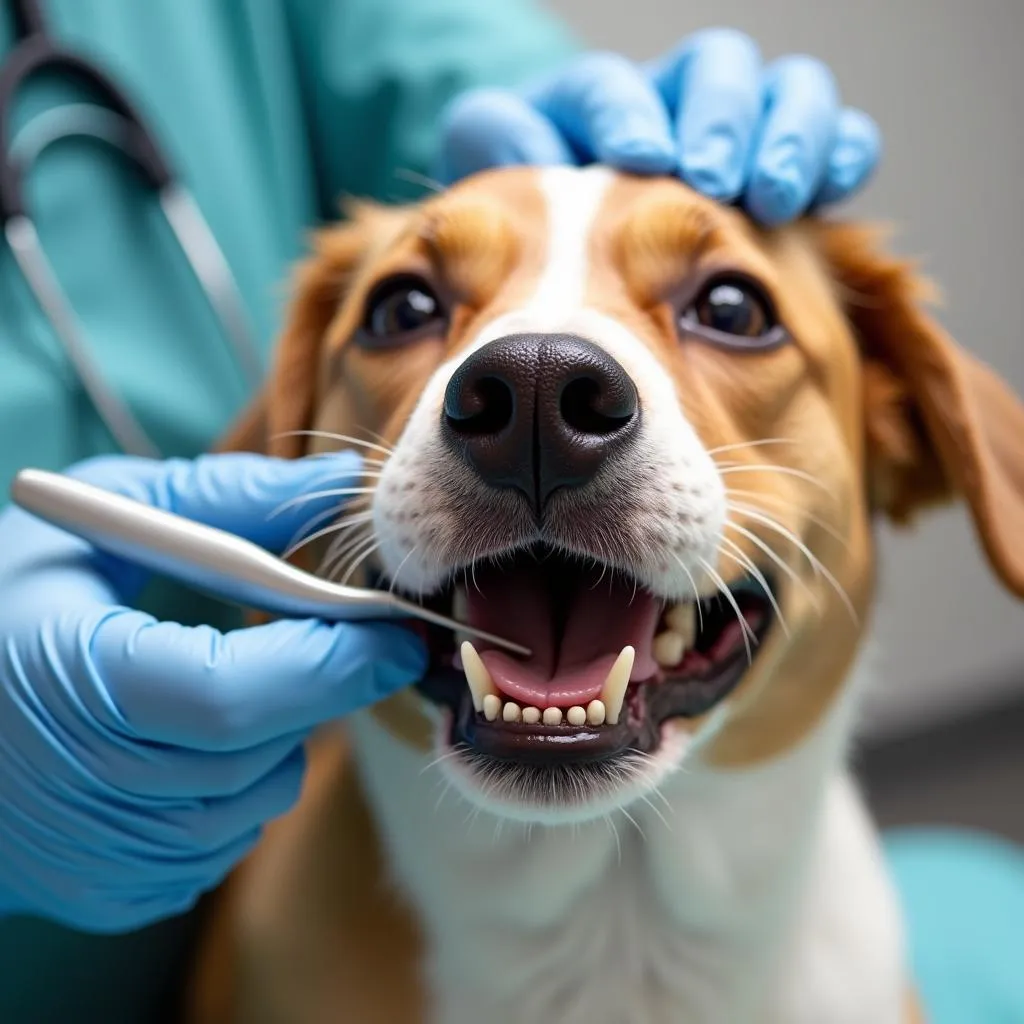“Con chó nhà tôi bị viêm miệng, nhìn thấy thương tâm quá! Mà không biết phải làm sao để chữa trị nữa!”. Bạn đang gặp phải tình huống tương tự? Đừng lo lắng! Bài viết này sẽ giúp bạn hiểu rõ hơn về bệnh viêm miệng ở chó, những biểu hiện, nguyên nhân, và cách xử lý hiệu quả. Cùng “i love my pet” tìm hiểu ngay nhé!
What is Stomatitis in Dogs?
Stomatitis, also known as oral inflammation, is a common condition in dogs that involves inflammation of the mouth, including the gums, tongue, cheeks, and roof of the mouth. This inflammation can manifest as redness, swelling, pain, and ulcers. It can be caused by various factors, and it’s important to understand the signs so you can seek prompt veterinary care.
What are the Signs of Stomatitis in Dogs?
Dogs with stomatitis may exhibit one or more of the following symptoms:
- Excessive drooling: This is often the first sign that something is wrong with your dog’s mouth.
- Bad breath: The odor can be quite strong, especially if there’s an infection.
- Refusal to eat: The pain associated with stomatitis can make it difficult for your dog to eat.
- Weight loss: This can occur if your dog is unable to eat properly due to pain or discomfort.
- Redness or swelling of the gums: This is a common symptom of stomatitis.
- Ulcers in the mouth: These sores can be painful and may bleed.
- Bleeding from the mouth: This can occur if the ulcers are severe.
- Difficulty swallowing: This is often due to pain or swelling in the mouth.
- Pawing at the mouth: Your dog may paw at their mouth in an attempt to relieve discomfort.
- Discolored teeth: This is a sign of underlying dental problems.
What Causes Stomatitis in Dogs?
The causes of stomatitis in dogs can vary, but here are some common culprits:
- Immune-mediated disease: This is a condition where the immune system attacks the tissues of the mouth, leading to inflammation.
- Bacterial infection: Bacteria can enter the mouth and cause infection, leading to inflammation.
- Fungal infection: Fungi can also infect the mouth, causing stomatitis.
- Viral infection: Some viral infections can affect the mouth and lead to stomatitis.
- Dental disease: This is a major contributing factor to stomatitis.
- Trauma: Injury to the mouth, such as from chewing on a sharp object, can cause inflammation.
- Certain medications: Some medications can have side effects that cause stomatitis.
- Food allergies: A reaction to certain ingredients in your dog’s food can trigger stomatitis.
 Dog exhibiting symptoms of stomatitis
Dog exhibiting symptoms of stomatitis
How is Stomatitis Diagnosed in Dogs?
Your veterinarian will examine your dog’s mouth and take a complete medical history. They may also perform additional tests, such as:
- Blood tests: To check for underlying medical conditions that may be contributing to the stomatitis.
- Dental radiographs: To assess the condition of the teeth and look for signs of dental disease.
- Oral swabs: To culture bacteria or fungi that may be present in the mouth.
- Biopsy: To rule out other conditions, such as cancer.
How is Stomatitis Treated in Dogs?
The treatment for stomatitis in dogs will depend on the underlying cause. Here are some common treatments:
- Antibiotics: To treat bacterial infections.
- Anti-inflammatories: To reduce inflammation and pain.
- Anti-fungals: To treat fungal infections.
- Immune-suppressive medications: To suppress the immune system if it’s attacking the tissues of the mouth.
- Dental cleaning: To address any dental disease that may be contributing to the stomatitis.
- Tooth extraction: In some cases, it may be necessary to extract teeth that are severely affected by dental disease.
- Dietary changes: Your veterinarian may recommend a special diet for your dog, such as a soft food diet or a diet that avoids certain ingredients.
What are the Long-Term Implications of Stomatitis in Dogs?
If left untreated, stomatitis can lead to:
- Chronic pain and discomfort: This can significantly affect your dog’s quality of life.
- Weight loss: This can lead to malnutrition and other health problems.
- Dental disease: Stomatitis can contribute to dental disease, which can lead to tooth loss.
- Systemic infections: In some cases, stomatitis can spread to other parts of the body.
 Dog receiving a dental cleaning for stomatitis
Dog receiving a dental cleaning for stomatitis
What Can I Do to Prevent Stomatitis in Dogs?
Here are some tips to help prevent stomatitis in dogs:
- Brush your dog’s teeth regularly: This helps to prevent plaque and tartar buildup, which can lead to dental disease.
- Feed your dog a balanced diet: A nutritious diet can help to support your dog’s overall health, including oral health.
- Provide your dog with plenty of chew toys: This can help to keep their teeth clean and healthy.
- Schedule regular dental checkups: Your veterinarian can identify any dental problems early on.
My Dog Has Stomatitis – What Should I Do?
The most important thing is to seek immediate veterinary care if you suspect your dog has stomatitis. Early diagnosis and treatment can help to prevent serious complications.
FAQs
Q: What is the prognosis for dogs with stomatitis?
A: The prognosis for dogs with stomatitis varies depending on the severity of the condition and the underlying cause. With proper treatment, many dogs can live normal, healthy lives.
Q: Can stomatitis be cured?
A: Stomatitis can often be managed, but it may not be completely cured. In some cases, the condition may recur.
Q: How can I tell if my dog’s bad breath is due to stomatitis?
A: If your dog has a strong, foul odor coming from their mouth, it’s a good idea to have them checked by a veterinarian. Bad breath can be a symptom of several conditions, including stomatitis, dental disease, and gastrointestinal problems.
Q: Can I treat my dog’s stomatitis at home?
A: No, it’s important to take your dog to the vet if you suspect they have stomatitis. Home remedies are not effective in treating this condition.
Q: Can humans get stomatitis from dogs?
A: While some strains of bacteria or fungi that cause stomatitis in dogs can also affect humans, transmission is uncommon. However, it’s always best to practice good hygiene, such as washing your hands after handling your dog.
Call to Action:
Need help with your dog’s stomatitis? Contact “i love my pet” at 0372960696 or email [email protected]. Our expert team is available 24/7 to provide you with guidance and support. Visit our website at [your website URL] for more information and resources.
Don’t hesitate to share this information with other pet owners! Together, we can ensure the well-being of our furry companions.
Leave a Reply
You must be logged in to post a comment.